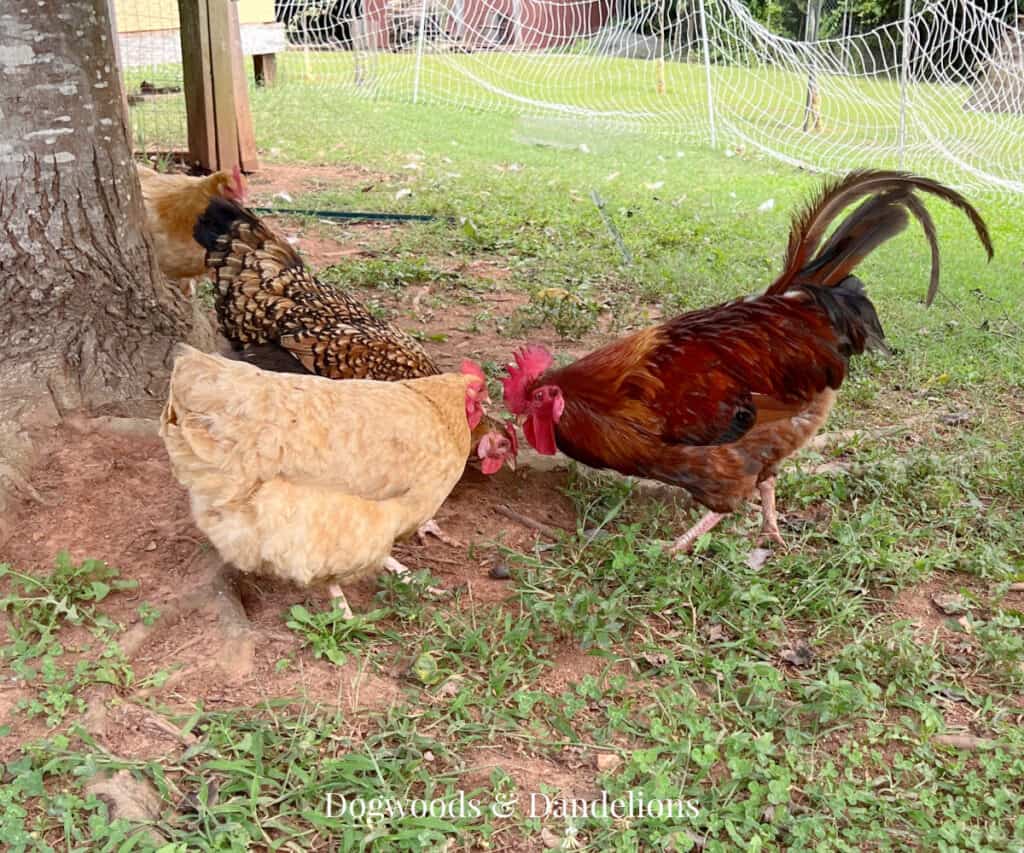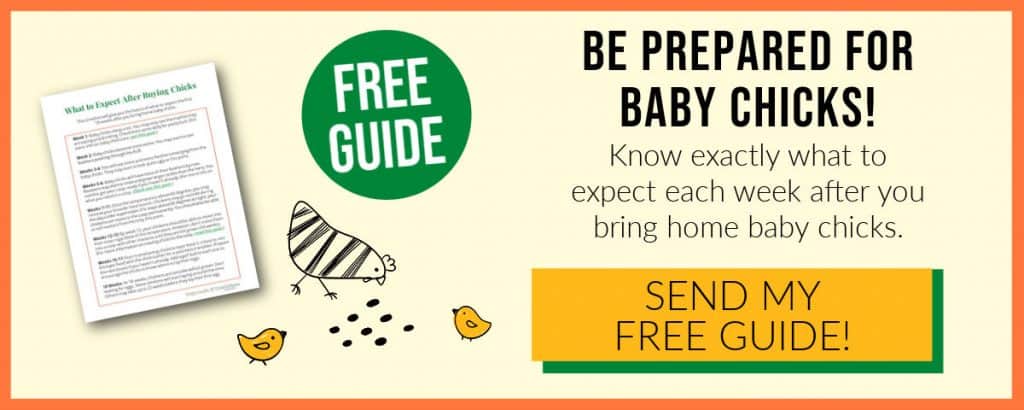How Many Chickens Should I Get?
Inside: Learn how to determine how many chickens you need for fresh eggs from your backyard flock.
If you want to get started raising backyard chickens for eggs, one of the first questions I get asked the most is “How many chickens should I get?”
While there is no perfect answer, these are some important factors to consider so that you can decide how many baby chicks to buy.
How Many Chickens Will Your City Allow?
The very first thing to consider will be how many chickens your city will let you have. Unfortunately, some city and local laws don’t allow for any chickens, so before you ever buy those baby chicks, do your research to be sure you can even have a flock.
If your city doesn’t allow chickens, decide whether you wish to fight the local ordinances or forget about raising chickens. There are several websites that have some great information on how to go about changing the zoning laws. This article from Grist has some really good information.

Affiliate Disclosure: Please note that some of the links in this article may be affiliate links and I may receive a small commission if you purchase something through a link. It will not change your cost. As an Amazon Associate, I earn from qualifying purchases. For more information, see my disclosures page.)
How Many Chickens Will Your Neighborhood Allow?
Secondly, if you live in a neighborhood, you need to see if your neighborhood homeowners association allows chickens. Many do, but plenty don’t either.
Better to find out BEFORE you purchase your flock rather than have to try to re-home your feathered friends.
How Much Yard Do You Have Available For Chickens?
The size of your backyard will also determine the number of birds you can keep. It is a good idea to decide how much space you can devote to your flock.
Chickens need room to roam and peck and if you only have a concrete patio, your chickens will not be happy. And having enough space for your flock is vital to raising a thriving flock of chickens and preventing health problems.
Likewise, if your yard is entirely covered in garden areas, you may not have room for a small flock unless you plan on repurposing some of that area. And the more chickens you have, the more room you need for your flock to free range.
Don’t forget – chickens will poop everywhere they go so you may want to confine them to one small area of your yard. Otherwise, you will end up with poop on your porches, your walkways, your outdoor lawn furniture, and anything else they can get to.
However, most people, with even a very small backyard can keep a few hens. This brings me to my next point…
How Big of A Coop & Run Do You Plan On Getting?
You need to decide how large of a coop and run you plan on purchasing or building. Most chickens need at least 4 square feet of floor space per bird inside the coop, so a 4-foot by 6-foot coop will adequately accommodate 6 birds.
For an enclosed run, you should provide at least 10 square feet per bird. Using the example above, for 6 birds, your chicken run should be 60 square feet. (You may need a building permit, depending on what kind of coop you plan on building.)
If at all possible, build your coop and run larger than you think you need. Extra space won’t harm your birds, it will give them more room to roam and play.
A larger area will also help prevent fighting (Pecking order is real, y’all.) and your flock will be less likely to pick up diseases. And healthy chickens naturally lay more eggs.
Finally, chicken keeping tends to become an addiction. Once you have a few birds, you often want more. (You’ve probably heard all the jokes about “chicken math”.) If you have a larger coop, you can add more birds to your backyard flock.
If you only have the bare minimum of space, adding more will lead to overcrowding and possibly behavioral problems in your chickens.
But remember, your flock size will largely be dependent on what your city ordinances allow and the available space in your yard.
How Many Eggs Do You Eat?
Of course, how many chickens you need also depends on how many eggs your family eats. It is best to determine this on a weekly average.
Do you regularly eat eggs for breakfast? What about breakfast for dinner? Do you do a lot of baking?
Keep a tally of how many dozen eggs you buy at the store each week for at least a month so that you have an idea of how many you currently use.
I will say, however, that once you have your own chickens, you will probably eat eggs a bit more often than you currently do. The fresh eggs taste so much better, it may be difficult to eat store-bought eggs again.
Do You Want Extra Eggs To Sell Or Give Away?
A final consideration is do you plan to sell extra eggs or give them away? If you have the room in your coop, it is perfectly fine to get a few extra hens. However, if your coop will be full, don’t plan to get extra chickens.
Crowded conditions will likely lead to more stress among your flock and stressed hens lay fewer eggs. They are also more prone to sickness and disease so don’t get more birds than you have room for.

How To Use This Information To Determine The Number Of Chicks You Should Buy
Once you have compiled your answers to the questions above, you can then determine the number of chicks to buy.
Many experts say that a chicken will lay approximately 270 eggs over the course of a year. I feel this number is a bit high.
Obviously, the number of eggs a chicken lays will vary from breed to breed. For instance, White Leghorns are said to lay between 280 and 320 eggs a year, while Rhode Island Reds lay about 260. But using an average of 270 eggs per hen works out to about 5 eggs a week per chicken.
I generally expect 4 eggs per week from each chicken. I like to be conservative with my numbers as I would rather have too many eggs than not enough eggs. (I can always find someone to take the extras off my hands.)
During the spring and summer months (peak laying season) your chickens may lay an egg every single day, especially in their first year. But during the winter months, they will lay fewer eggs. A hen needs about 14 hours of daylight to create an egg.
A hen may also stop laying for several months while she molts. You can freeze extra eggs during peak laying time so that you have some to use when your hens aren’t laying.
What’s the Minimum Number of Chickens I Can Raise?
The absolute minimum number of chickens you can keep for a happy flock is 3. Chickens are social creatures and need the company of others.
However, when purchasing baby chicks, I personally recommend buying at least 4. Occasionally, a baby chick will die or you will get a rooster, so to keep a minimum of 3, it’s best to purchase 4 unless your space will not allow it.
Many local feed stores and hatcheries will also have a minimum number of chickens you can purchase so that they will stay warm while being shipped or transported home.

How Many Chickens Do I Need for a Family of 4?
For an average family of 4 – 5 people, I recommend 4 – 6 chickens. Our very first flock of 5 hens, kept my family of 5, plus my Mom, Dad, and sister in eggs for most of the year.
Keep in mind, as a chicken ages, her egg production will slow down. She will lay fewer and fewer eggs each year.
So after 2 or 3 years, you may wish to add more hens to your flock if space allows. (Read How to Integrate Two Flocks of Chickens for more information.)
Raising chickens in your backyard is a great family activity. You will quickly develop relationships with your hens if you interact with them every day.
But the number of hens you keep will vary based on your family’s individual needs. Keep in mind, that adding extra chickens to your flock will also increase your cost of feed so it may not be advisable to raise more chickens than you really need.
The ideal flock size varies from family to family. Hopefully, this post has helped you decide how many chickens you need in your flock so you can enjoy fresh eggs for years to come.
For more information on raising backyard chickens, start here. I’ve got lots of posts that will walk you through the entire process, from setting up your brooder to choosing the friendliest chicken breeds.
And if you want different breeds of chickens, you can choose breeds based on egg color. These are the best chicken breeds that lay white eggs and the best breeds that lay blue eggs.
Related Posts
- How to raise baby chicks safely
- What you really need when building a chicken coop
- How to care for your baby chicks when you bring them home

Meet Julie
I’m a farm girl born and bred in North Carolina. I’ve been growing a vegetable garden for over 20 years (and helping my Mom grow hers even longer). I’ve been raising chickens in my bathtub and backyard for 12+ years. I believe that homegrown food can be made simple. Let’s get started.



I’m single and use about 12 eggs/wk, myself. My dogs & cats account for about another 3-5/wk.
New to chickens and getting close to finishing a home-built coop. From everything I’ve heard & read, 4 chickens would do me. My coop & hen house is designed for a max of 6 birds. I plan to free-range, as I’ve loads of open space on my rural property. It’s a bit disconcerting, as there are several egg-laying breeds that seem desirable, but hatcheries will only sell in multiples of 10; too many. My local Tractor Supply has chicks in multiples of 4, but not the breeds I was thinking of, at least right now. They tell me they never know what breeds they’ll get or how many. That seems odd! Also, I read where the feed stores buy “straight runs” that could very well include roosters. I only want hens.
What do you think?
Four chickens would probably be enough for you. Hatcheries have to sell in larger numbers because the chicks need each other to keep warm while they are shipped. And not all feed stores sell only straight-run chicks. Many do sell just pullets though there is still a chance you may get a rooster unless you are purchasing an auto-sexing (sex-linked) breed.
There is only one of me, but I’d like to be able to sell a few eggs to help out the budget. I also would like to be able to freeze some for winter use. I don’t bake a LOT, but since there are more and more low carb baking recipes every month, may do more in the future.
I know that selling eggs isn’t a real profit maker, but I could sell some just to help pay for the upkeep of the hens I will have.
Any advice for me?
You say 4-6 chickens, for a family of 4, I’m thinking at least 3 hens for me to do what I want.. I would want some for meat as well. I just don’t see how I could have meat AND egg birds….how to keep them separate for the differing feed requirements…
Thank you for the post!
Without knowing how many eggs you eat each week, it is hard to say, but you need a minimum of three chickens regardless of what you plan to do. (Chickens like to around other chickens.) However, I would probably start with 6 to have some eggs to sell.
For meat birds, you would have to have a separate enclosure for them as they are ready to butcher in 8-12 weeks. Meat breeds get too big for their legs to support them after about 3 months.
Of course, after your egg-laying hens are past their prime laying days (2-3 years) you can butcher them and use them as stewing hens. Hope this information helps you make some decisions.